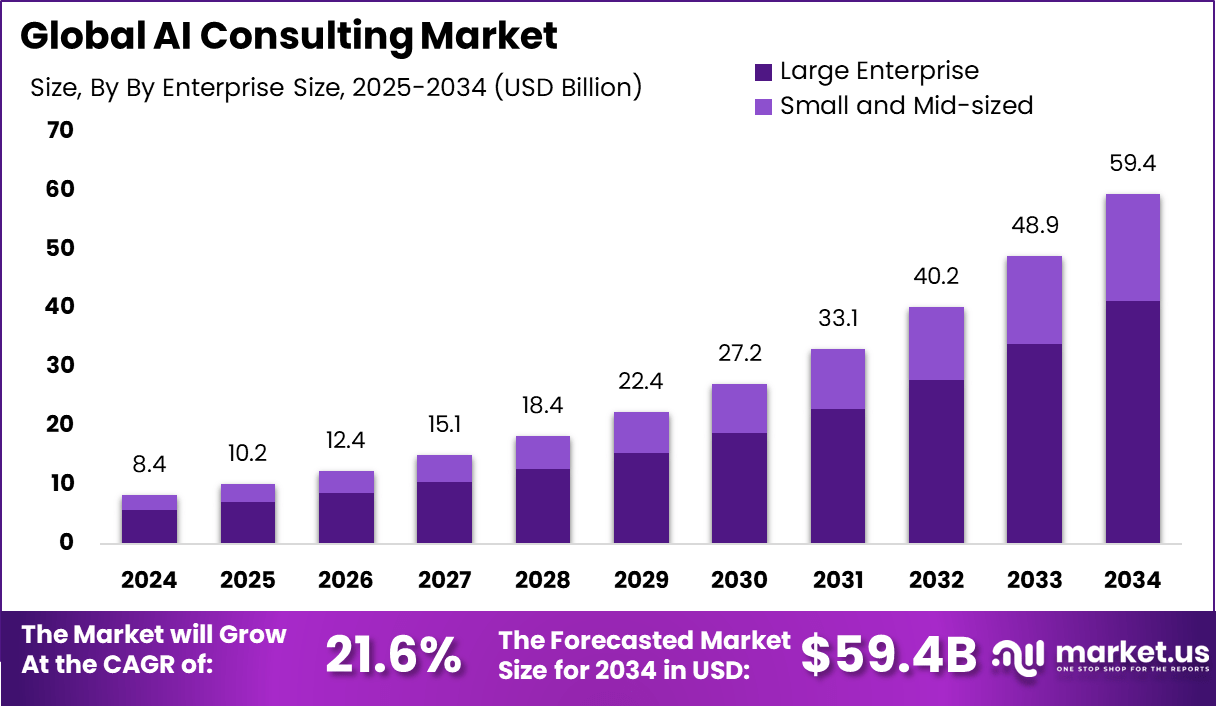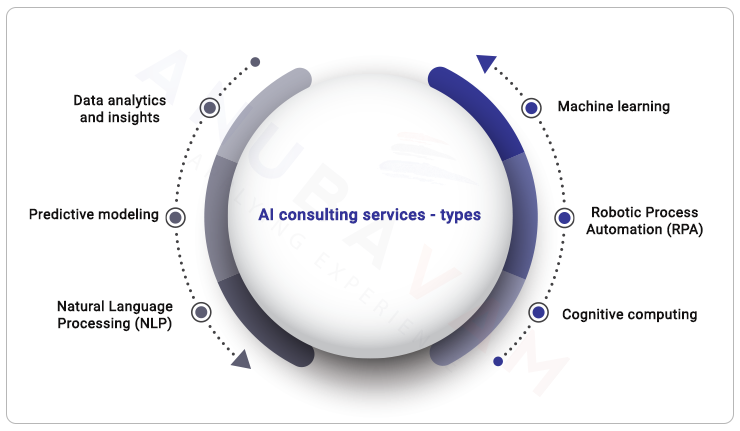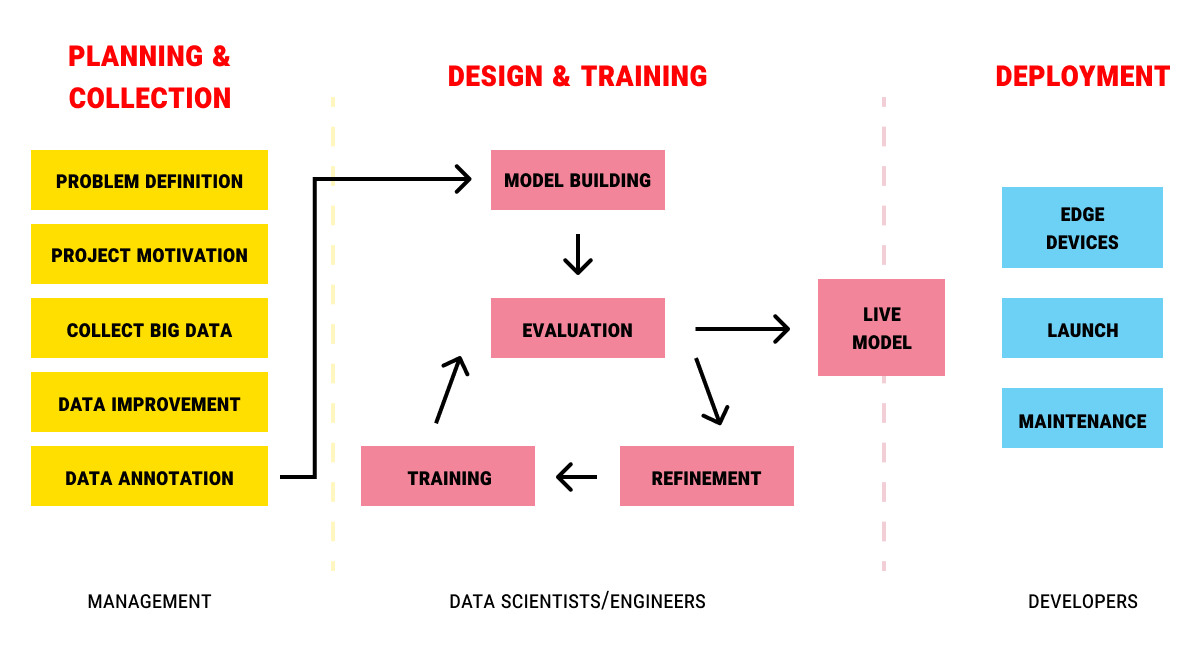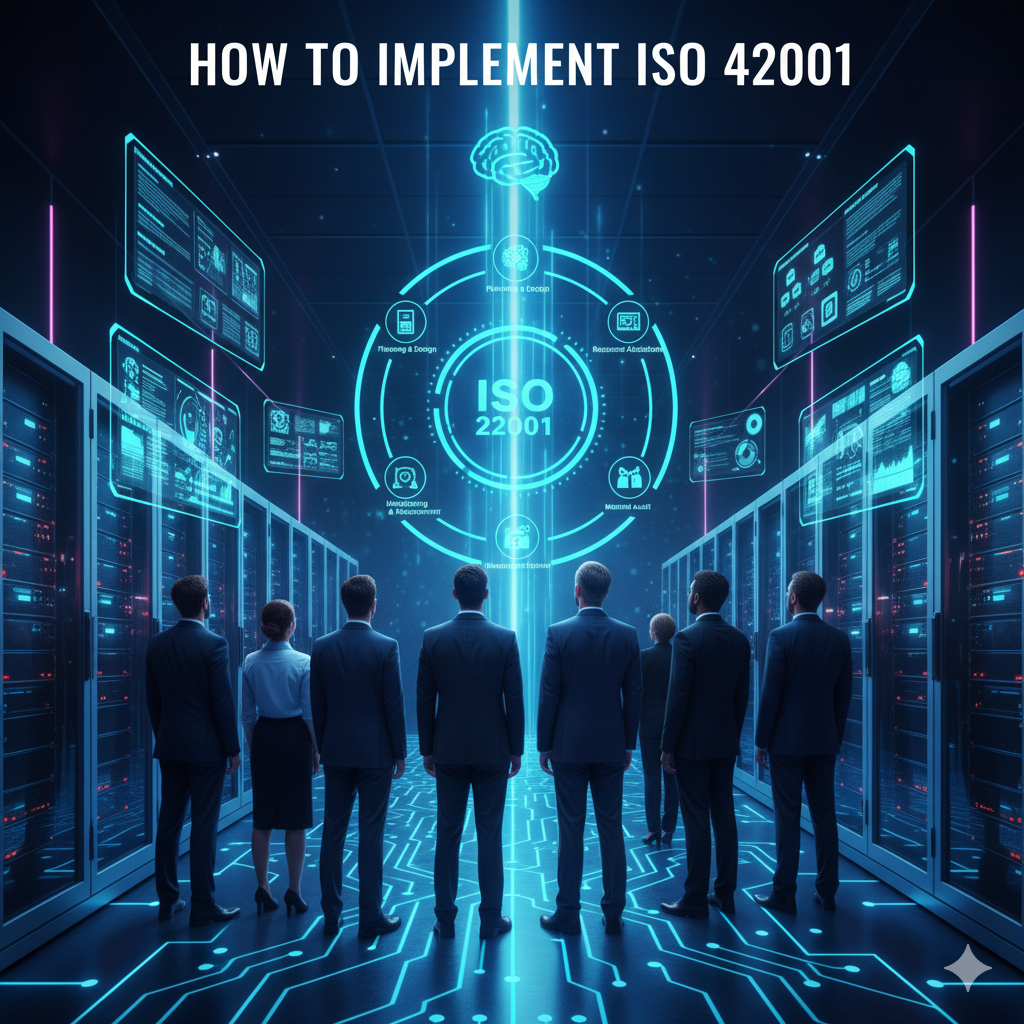AI consulting involves hiring external experts to help organizations develop, implement, and manage artificial intelligence solutions. These consultants provide services ranging from strategic planning and technical implementation to ongoing system maintenance and staff training.
The AI consulting market has grown substantially as more businesses recognize artificial intelligence’s potential for improving operations and driving innovation. Research from the IBM Institute for Business Value shows that 80 percent of business leaders view AI explainability, ethics, and trust as major barriers to adoption, highlighting the need for expert guidance.

Source: Market.us
Choosing the right AI consultant can determine whether an AI initiative succeeds or fails. Business leaders face a complex landscape of service providers with varying expertise levels, specializations, and approaches. The wrong choice can result in wasted resources, failed implementations, or systems that create more problems than they solve.
Understanding Different Types of AI Consulting Services
AI consultants typically offer several core service categories. Strategy consulting helps organizations identify where AI can create business value and develop implementation roadmaps. Technical consulting involves building and deploying AI systems, while operational consulting focuses on managing AI systems after deployment.

Source: Anubavam
Many consultants provide end-to-end services covering the entire AI lifecycle. Others specialize in specific areas such as machine learning model development, data engineering, or regulatory compliance. Some focus on particular industries like retail, healthcare, finance, or manufacturing.
The consulting landscape includes large global firms, specialized AI boutiques, and technology vendors offering consulting services. Each type brings different strengths and limitations that organizations must consider when making selection decisions.
Key Technical Skills Your AI Consultant Needs
Effective AI consultants demonstrate proficiency across multiple technical domains. Machine learning expertise forms the foundation, including knowledge of algorithms, model training, and validation techniques. Data engineering skills are equally important for managing the data pipelines that feed AI systems.
Programming competency in languages like Python and R is essential for most AI projects. Consultants also understand cloud platforms such as AWS, Google Cloud, or Microsoft Azure where many AI systems operate. Experience with AI frameworks like TensorFlow or PyTorch indicates hands-on technical capability.
The National Institute of Standards and Technology emphasizes the importance of understanding AI risk management throughout the development lifecycle. Consultants demonstrate knowledge of bias detection, fairness metrics, and ongoing monitoring practices that maintain system performance over time.
Why Industry Experience Matters More Than You Think
Industry expertise has become increasingly valuable as AI applications mature and regulatory requirements grow more complex. Healthcare AI projects require understanding of HIPAA regulations and FDA approval processes. Financial services implementations must address banking regulations and fair lending requirements.
Specialized knowledge extends beyond compliance to include industry workflows, data types, and business models. A consultant experienced in retail understands inventory optimization and customer personalization challenges that differ significantly from manufacturing predictive maintenance applications.
Organizations benefit from evaluating consultants’ track records within their specific industry. Previous experience with similar use cases, regulatory environments, and organizational structures often translates to more effective implementations and fewer unexpected challenges.
How to Evaluate AI Consultant Track Records
Consultant portfolios include concrete examples of successful AI implementations with measurable business outcomes. Revenue increases, cost reductions, and efficiency improvements provide evidence of real-world value creation. Organizations request case studies relevant to their industry and use cases.
Client references offer insights into consultant performance beyond formal case studies. Speaking directly with previous clients reveals information about communication styles, project management capabilities, and long-term support quality. References can also provide realistic timelines and budget expectations.
Project complexity and scope in previous engagements indicate consultant capabilities for handling similar challenges. Consultants who have successfully managed large-scale implementations with multiple stakeholders demonstrate skills that smaller projects may not reveal.
Understanding AI Consulting Pricing Models
AI consulting pricing varies significantly based on service models and consultant types. Hourly rates typically range from $150 to $500 per hour depending on expertise level and geographic location. Project-based pricing can range from $5,000 for small implementations to millions for enterprise-wide transformations.
Value-based pricing ties consultant compensation to achieved business outcomes. This model aligns consultant incentives with client success but requires clear metrics and measurement frameworks. Retainer arrangements provide ongoing access to consultant expertise for organizations with multiple AI initiatives.
Cost evaluation considers total project expenses including technology licensing, infrastructure requirements, and internal resource allocation. Hidden costs such as training, change management, and ongoing maintenance can significantly impact total investment requirements.
Essential Questions to Ask During Consultant Interviews
Ask these questions to understand the consultant’s technical depth and hands-on experience with AI technologies:
- What specific AI frameworks and platforms do you work with most frequently? Follow up by asking them to walk through a recent project where they implemented a specific framework they mentioned.
- How do you approach data quality assessment and preparation for AI projects? Understanding what percentage of project time typically goes to data preparation versus model development reveals their practical experience.
- Which cloud platforms do you have experience deploying AI models on? Ask what factors influence their recommendation for one cloud provider over another.
- How do you evaluate model performance and accuracy in production environments? They can describe their model monitoring and retraining processes.
Understanding how consultants manage projects reveals their ability to deliver results on schedule and within scope. Most successful AI projects benefit from agile approaches due to the iterative nature of model development.
Look for consultants who can clearly articulate specific deliverables for each project phase. They explain how they handle dependencies between different workstreams and provide realistic timelines based on similar past projects.
Red Flags That Signal the Wrong Consultant
AI consultants who promise immediate, transformative results raise immediate concerns about their understanding of AI implementation realities. Legitimate AI projects require careful planning, data preparation, model development, testing, and gradual deployment phases that cannot be rushed without compromising quality or safety.
Common overpromises include claims about achieving enterprise-wide AI transformation in weeks rather than months or guaranteeing specific ROI percentages without understanding business context. Consultants who suggest AI can replace human decision-making entirely demonstrate fundamental misunderstanding of AI capabilities and limitations.
Generic AI experience proves insufficient for specialized industries where regulatory requirements, business processes, and risk tolerances create unique implementation challenges. Consultants without industry-specific knowledge often underestimate compliance complexities or propose solutions that violate sector-specific regulations.
Communication problems often signal deeper issues with consultant competence, project management capabilities, or commitment to client success. Consultants who cannot explain AI concepts clearly, avoid direct questions, or hide behind technical jargon may lack the expertise they claim.
Making Your Final Decision

Source: Demand Metric
Create a scoring matrix that weights different criteria based on your organization’s priorities. Rate each consultant’s expertise in relevant AI technologies, programming languages, and platform experience while reviewing their proposed technical approach.
Evaluate each consultant’s track record in your sector and familiarity with industry-specific regulations. Healthcare organizations require consultants who understand HIPAA compliance, while financial services need expertise in banking regulations and fair lending requirements.
Compare proposed project timelines, milestones, and delivery approaches. Assess each consultant’s risk management strategies and contingency planning while evaluating their change management approach and how they plan to integrate with your existing teams.
Contract negotiations establish the foundation for a successful consulting relationship. Define ownership of AI models, algorithms, and custom code developed during the engagement while establishing clear terms for data handling, storage, and protection throughout the project.
Identify quantifiable business outcomes that define project success, such as cost reduction percentages, accuracy improvement targets, or revenue impact goals. Establish baseline measurements and data collection methods before project start.
Frequently Asked Questions About Choosing AI Consultants
How much does AI consulting typically cost for small businesses?
AI consulting costs for small businesses typically range from $25,000 to $150,000 for initial implementations, depending on project scope and complexity. Many consultants offer phased approaches that allow businesses to start with smaller pilot projects costing $10,000 to $50,000 and expand gradually as they demonstrate value.
Boutique AI consultancies often provide more flexible pricing structures than large consulting firms, making specialized expertise accessible to smaller organizations. Cloud-based AI platforms have reduced infrastructure costs, making consultant-guided AI projects more affordable for businesses of all sizes.
What’s the difference between AI strategy consulting and implementation consulting?
AI strategy consulting focuses on high-level planning and organizational readiness for AI adoption. Strategy consultants help identify appropriate AI use cases, develop governance frameworks, assess organizational capabilities, and create roadmaps for AI integration.
Implementation consulting involves hands-on technical development, system integration, and deployment of AI solutions. Implementation consultants write code, train machine learning models, integrate AI systems with existing infrastructure, and manage the technical aspects of bringing AI solutions into production environments.
How long do most AI consulting engagements take from start to finish?

Source: Label Your Data
AI consulting engagements typically range from several months for focused implementations to multiple years for comprehensive organizational transformations. Strategy development projects often take three to six months, while technical implementations can range from six to 18 months depending on complexity.
Timeline factors include the maturity of existing data infrastructure, the complexity of AI applications being developed, regulatory requirements in your industry, and the availability of internal resources to support the project. Organizations with well-organized data and clear business requirements typically complete projects faster.
What happens if an AI project doesn’t deliver the expected results?
Reputable AI consultants implement risk mitigation strategies including clear success metrics, phased delivery approaches, and regular project reviews to identify issues early. Organizations benefit from working with consultants who provide detailed project scoping, realistic timeline estimates, and transparent communication about potential challenges.
Consultant agreements include specific deliverables, performance metrics, and procedures for addressing underperforming projects. Some consultants offer outcome-based pricing models where compensation is tied to achieving measurable business results rather than hours worked.
Can organizations manage AI systems internally after consulting projects end?
Most AI consulting engagements include knowledge transfer components designed to build internal capabilities. Effective consultants provide comprehensive documentation, hands-on training for technical teams, and structured transition plans that reduce long-term dependency on external support.
Organizations typically maintain some level of consulting relationship for ongoing optimization, model updates, and strategic guidance even after achieving operational independence. The goal is building internal expertise while retaining access to specialized knowledge for complex challenges or new initiatives.
Choosing Your AI Consulting Partner
The AI consulting landscape presents both unprecedented opportunities and complex challenges for organizations seeking to harness artificial intelligence’s transformative potential. As IBM research confirms that 80 percent of business leaders see AI explainability, ethics, and trust as major barriers to adoption, selecting the right consulting partner has evolved from a strategic advantage to a critical necessity for successful AI implementation.
The factors that distinguish successful AI consulting partnerships extend far beyond technical competency. While machine learning expertise, data engineering capabilities, and cloud platform proficiency remain fundamental requirements, today’s AI consultants must also demonstrate deep regulatory knowledge, industry-specific experience, and sophisticated risk management capabilities.
Industry specialization has emerged as a critical differentiator in consultant selection. Generic AI expertise proves insufficient in highly regulated sectors where consultants must understand healthcare privacy requirements, financial services risk management frameworks, or manufacturing safety protocols. Organizations that prioritize consultants with relevant industry experience consistently achieve better outcomes through implementations that align with sector-specific workflows, regulations, and business models.
With careful consultant selection based on technical expertise, industry experience, and proven track records, organizations can confidently embark on AI initiatives that drive innovation, enhance efficiency, and create lasting competitive advantages in an increasingly AI-driven business environment. Whether implementing AI agents in sales or developing customer service automation, the right consulting partner makes the difference between success and failure.

